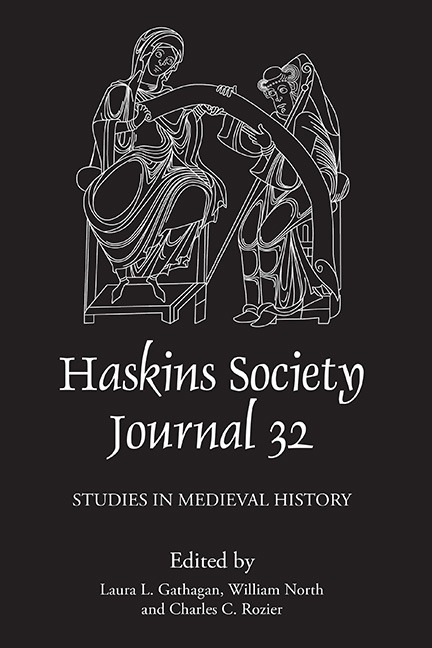Book contents
- Frontmatter
- Contents
- List of Illustrations
- Editors’ Note
- Abbreviations
- 1 Nearly-Not Miracles of the Carolingian Era: A Hypothesis
- 2 Noble Fathers and Low-Status Daughters in the Eleventh Century: Rilint, libera, and Hiltigund, presbyterissa
- 3 The Norman Conquest of England, the Papacy, and the Papal Banner
- 4 Ostmen, Normans, or Norwegians? Names and Identities in the Irish Sea World c. 1100
- 5 The Origins of Administrative Lordship in Medieval Flanders: A Reassessment
- 6 Multiple Allegiance and Its Impact: England and Normandy, 1066–c. 1204
- 7 The Wiley Lecture: Monsters in Anglo-Norman Historiography; Two Notes on William of Newburgh’s Revenants
- 8 A Female King or a Good Wife and a Great Mother? Seals, Coins, and the Epitaphic Legacy of the Empress Matilda
- 9 Harangue or Homily? Walter Espec, Deuteronomy, and the Renewal of the Covenant in Aelred of Rievaulx’s Relatio de Standardo
- 10 Anger Management: Modeling Christian Kingship in Peter of Blois’s Dialogus
- 11 In His Name: Religion as Administrative Strategy in Thirteenth-Century Champagne (and Navarre?)
- 12 Warhorse Markets and Social Status of Combatants under Edward I of England, 1296–1307
1 - Nearly-Not Miracles of the Carolingian Era: A Hypothesis
Published online by Cambridge University Press: 19 May 2022
- Frontmatter
- Contents
- List of Illustrations
- Editors’ Note
- Abbreviations
- 1 Nearly-Not Miracles of the Carolingian Era: A Hypothesis
- 2 Noble Fathers and Low-Status Daughters in the Eleventh Century: Rilint, libera, and Hiltigund, presbyterissa
- 3 The Norman Conquest of England, the Papacy, and the Papal Banner
- 4 Ostmen, Normans, or Norwegians? Names and Identities in the Irish Sea World c. 1100
- 5 The Origins of Administrative Lordship in Medieval Flanders: A Reassessment
- 6 Multiple Allegiance and Its Impact: England and Normandy, 1066–c. 1204
- 7 The Wiley Lecture: Monsters in Anglo-Norman Historiography; Two Notes on William of Newburgh’s Revenants
- 8 A Female King or a Good Wife and a Great Mother? Seals, Coins, and the Epitaphic Legacy of the Empress Matilda
- 9 Harangue or Homily? Walter Espec, Deuteronomy, and the Renewal of the Covenant in Aelred of Rievaulx’s Relatio de Standardo
- 10 Anger Management: Modeling Christian Kingship in Peter of Blois’s Dialogus
- 11 In His Name: Religion as Administrative Strategy in Thirteenth-Century Champagne (and Navarre?)
- 12 Warhorse Markets and Social Status of Combatants under Edward I of England, 1296–1307
Summary
The Carolingian period saw significant change in the production and consumption of miracles. Miracles clearly remained crucial in many contexts, but they also lost ground in others. Paradoxically, one of the contexts in which they receded was saints’ lives. A new division of labour was being established between different sources of religious authority, which, in turn, found expression in the transformation of old and the development of new branches of the hagiographical genre with increasingly distinct narrative styles and ways of treating sanctity: saints’ lives, miracle collections, relic translations, martyrologies. Carolingian re-writings of Merovingian and earlier saints’ lives still attributed new miracles to relics, and described older saints performing miracles during their lifetime. The biographers of more recent, ‘modern’ saints, by contrast, focused more on their good works, excellent character, or high-level administrative skills, resulting in a more drab, humdrum style of sanctity. In the late fourth century, Saint Martin had healed, raised the dead, and performed exorcisms. Saints of the late eighth and ninth century were no longer portrayed as doing such things, at least during their lifetime.
These changes point to a significant reorganization of the symbolic field of holiness. I would like to focus here on a symptom of this wider reorganization: that is, the changing character of those miracles that recent saints were said to have performed. Not only did recent saints perform far fewer miracles in the Carolingian period; when they did produce them, they were also far less noteworthy. Indeed, many events they describe are so banal that it takes effort to see them as miraculous at all. Carolingian lives of recent saints were often finely wrought, with a flair for the dramatic, and a rich and complex understanding of human emotions and relationships. It is only when it comes to miracles, traditionally the most dramatic and exciting part of hagiography, that these authors appear to relinquish all claim to either art or style, and seem not even to try to make them at all interesting. Though a small-scale phenomenon in quantitative terms, this change in the character of Carolingian miracles is strange enough to be a problem worth solving. I hope to show that such apparently unimpressive examples do not indicate any aversion towards miracles, but shed light on evolving tastes, and, in particular, a conscious shift towards a more esoteric understanding of the miraculous.
- Type
- Chapter
- Information
- Publisher: Boydell & BrewerPrint publication year: 2021



